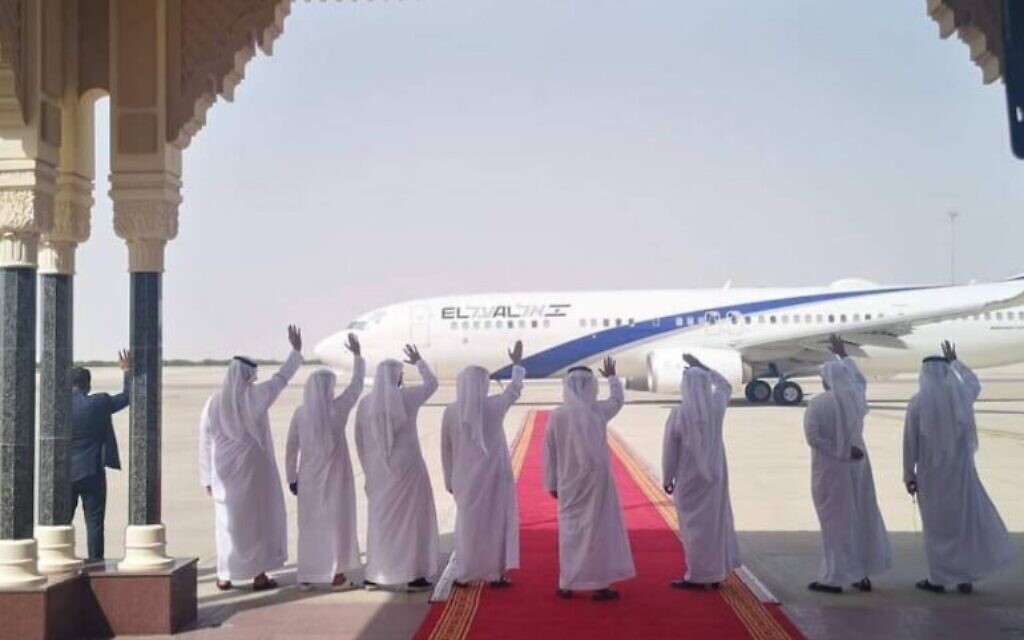“This is an important milestone in Arab-Israeli relations,” said Anwar Gargash, the then United Arab Emirates’ minister of state for foreign affairs, last August, just a day after Israel and the UAE reached a historic normalization agreement.
He was absolutely right.
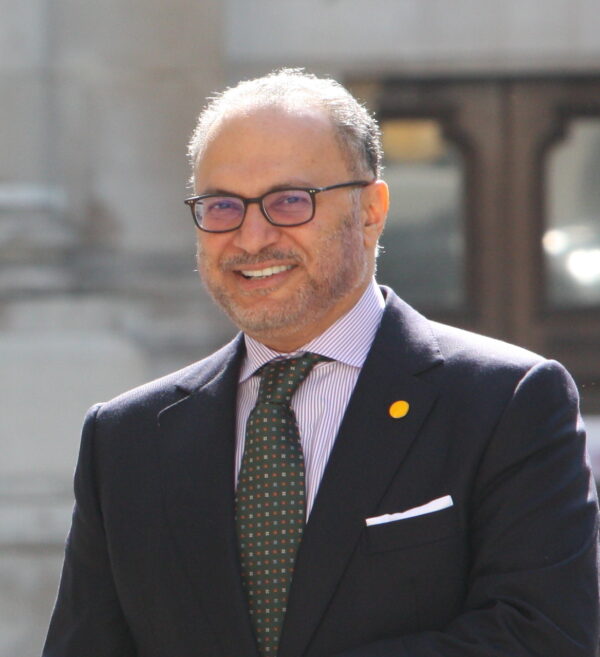
Israel’s accord with the UAE, its third peace treaty with an Arab state in some four decades, was indeed historic. As Israel’s former president, Reuven Rivlin, noted, “Today, a new era began in the relations of the state of Israel with the Arab world.”
Brokered, in part, by Jared Kushner, President Donald Trump’s son-in-law and senior advisor, it was followed in relatively quick succession by three similar agreements intended to normalize Israel’s relations with Bahrain, Sudan and Morocco.
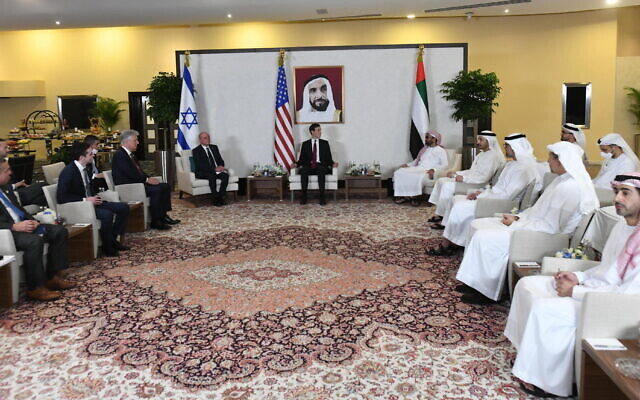
While Israel’s bilateral relations with Egypt and Jordan developed slowly after their 1979 and 1994 peace treaties, Israel’s ties with the UAE got off to a fast and promising start.
Gargash set the tone.
“We are not talking about a very slow and gradual process,” he told the Israeli news site Walla on August 14, a day after the UAE’s agreement with Israel was announced in Washington by Trump. “There are sectors that we would like to develop with Israel, and there are sectors that Israel would like to develop with us.”
Ticking off the fields in which the UAE would seek cooperation with Israel, Gargash listed desert agriculture, food security, cyber security, tourism, technology and trade.

Within three months of his announcement, an Israeli delegation of business leaders from the Chambers of Commerce, the Manufacturers Association and the Israel Export Institute arrived in Dubai to lay the groundwork for Gargash’s vision.
From a purely commercial point of view, Israel regards the UAE — an international trade hub and a free trade zone that has attracted investors and startups — as a gold mine.
With the volume of trade between the two countries expected to reach billions of dollars per year in the near future, Israel expects to be selling the UAE products ranging from medical to water desalination equipment as well as software services.
A proposed project to move UAE oil to the Israeli port of Ashkelon via Eilat has been frozen due to environmental concerns. Despite this setback, Israel’s volume of trade with the UAE is booming, having reached the $570 million mark earlier this summer.
With both sides viewing the agreement as a major economic driver, it was hardly coincidental that the UAE established its embassy in Tel Aviv in the Stock Exchange building.

Israeli Foreign Minister Yair Lapid visited the UAE late in June, in the first official trip by an Israeli minister, to open Israel’s embassy in Abu Dhabi and its consulate in Dubai.
Mohammad Mahmoud Al-Khajah, the UAE’s ambassador to Israel, formally opened the embassy on July 14 in the presence of, among other dignitaries, Israeli President Isaac Herzog, who said that the creation of formal diplomatic relations between the two nations once seemed like “a distant dream.”
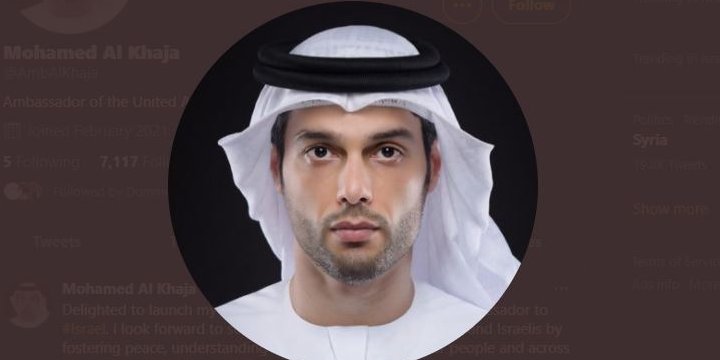
In his comments, Khajah said this diplomatic breakthrough could well usher in an era of “dignity, prosperity and peace.”
Eleven days later, the appointment of Israel’s first ambassador to the UAE, Amir Hayek, was announced. He seems like the perfect candidate for the job. Formerly director-general of the Ministry of Industry, Trade and Labor, he was previously president of the Israel Hotel Association and the Manufacturers Association.
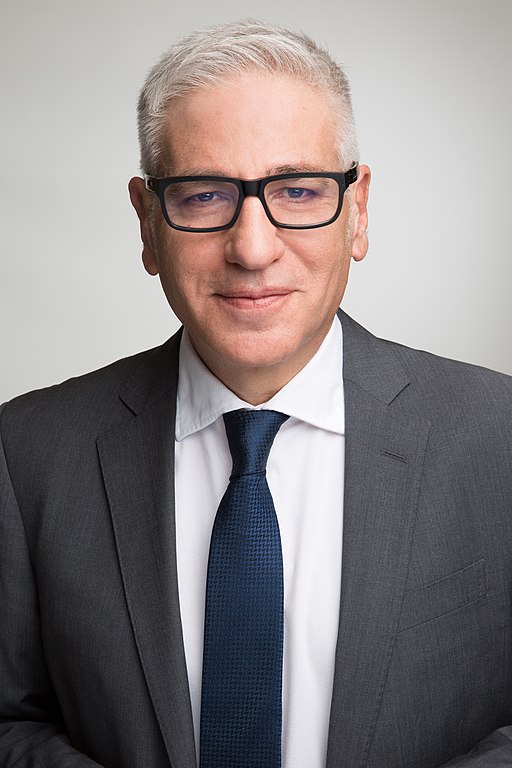
Prior to this announcement, Prime Minister Naftali Bennett spoke with the UAE’s de facto ruler, Crown Prince Mohamad bin Zayed al-Nahyan, while Israel and the UAE ratified their first agricultural agreement. Signed by Israeli Agricultural Minister Oded Forer and UAE Minister of Food and Water Security Mariam Al-Muhairi, it is meant to foster mutual cooperation in, among other fields, water management and irrigation.
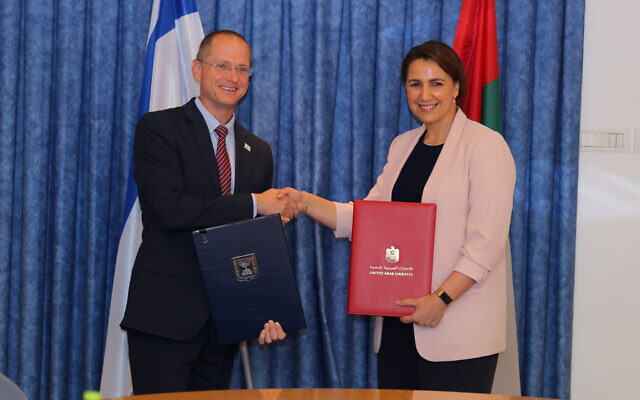
Thanks to an aviation agreement, there are now regular flights between Israel and the UAE. And in anticipation of a flood of Israeli tourists descending on the UAE, the coronavirus pandemic notwithstanding, major hotels there have set up kosher kitchens.
It remains to be seen whether Israel and the UAE will cooperate on a strategic military level, but they share a common enemy in Iran, the preeminent Shi’a power in the Middle East.
The spectre of Iran as a domineering bully in the region almost certainly convinced the UAE to formalize its informal relationship with Israel. Until last August, Israel maintained an unobtrusive presence in the UAE through its office in the International Renewable Energy Agency in Abu Dhabi.
Israel’s ex-prime minister, Benjamin Netanyahu, boasted that Israel normalized relations with the UAE under a new doctrine based on two principles: peace for peace and peace through strength.
In establishing diplomatic relations with the UAE, Israel flouted the conventional pan-Arab demand that peace with an Arab neighbor would only be possible if it ended its conflict with the Palestinians and withdrew from the West Bank. “In effect, this mistaken concept gave the Palestinians a veto over achieving peace between Israel and Arab countries,” Netanyahu said.
“This peace was not achieved because Israel weakened itself by withdrawing to the 1967 lines,” he added. “It was achieved because Israel strengthened itself by cultivating a free economy, and military and technological strength, and by combing these two strengths to achieve unprecedented international influence.”
Netanyahu, though, had to pay a steep price for normalization. He was forced to cancel his much-vaunted and heavily-criticized plan to annex the Jordan Valley and all of Israel’s settlements and outposts in the West Bank. And he had to come to terms with the United States’ plan to sign a substantial arms deal with the UAE, which is firmly in the Western camp.
Jamal Al-Musharakh, the director of the UAE’s policy planning department in the Foreign Ministry, said the “halting of annexation was a prerequisite” for the normalization agreement with Israel to go through.
“We remain with the Arab consensus and Arab resolutions,” he said by way of justifying the UAE’s rapprochement with Israel. “What we did was halt the annexation. The ultimate end solution is to find a sustainable solution between the Israelis and the Palestinians.” The UAE, he went on to say, staunchly supports a two-state solution.
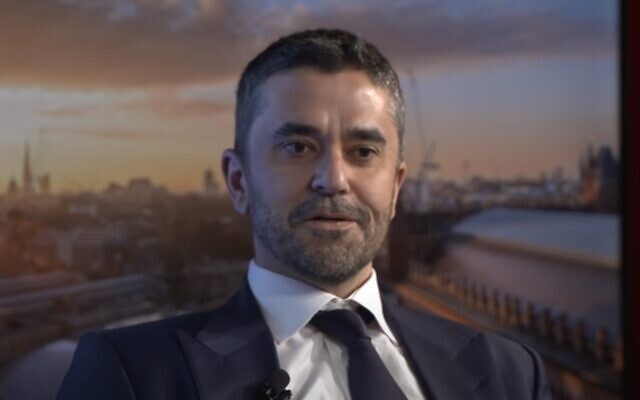
The UAE’s assistant minister for culture and public diplomacy, Omar Saif Ghobash, said it would now be better positioned to exert influence on Israel to resolve the Palestinian problem. “Our peace with Israel will serve the Palestinian cause in ways we cannot predict today,” he said. “We, as a major economy and as a major player in the Middle East, will better be able to serve the Palestinian cause … by having economic and commercial ties with the Israelis than by standing outside the tent and waiting for history to take its course.”
Certainly, the most recent war in the Gaza Strip, pitting Israel against Hamas this past May, had no detrimental effect on Israel’s ties with the UAE.
Israel initially expressed concerns that the $23 billion sale of 50 F-35 fighter jets to the UAE could affect the balance of power in the region. The then U.S. secretary of state, Mike Pompeo, allayed Israeli fears by promising to maintain Israel’s qualitative military advantage over its Arab neighbors and by promoting the arms deal through the lens of helping the UAE to “defend itself against heightened threats from Iran.”
Although Israel has made remarkable strides in forging formal links with the UAE, Bahrain, Sudan and Morocco, Israel still has a long way to go before it can normalize relations with Arab neighbors such as Saudi Arabia, Yemen, Syria, Iraq or Lebanon.
Contrary to Netanyahu’s belief that the gnawing Palestinian problem can be shunted aside, the evidence suggests that most Arab states will remain hostile toward Israel as long as this thorny issue festers.
